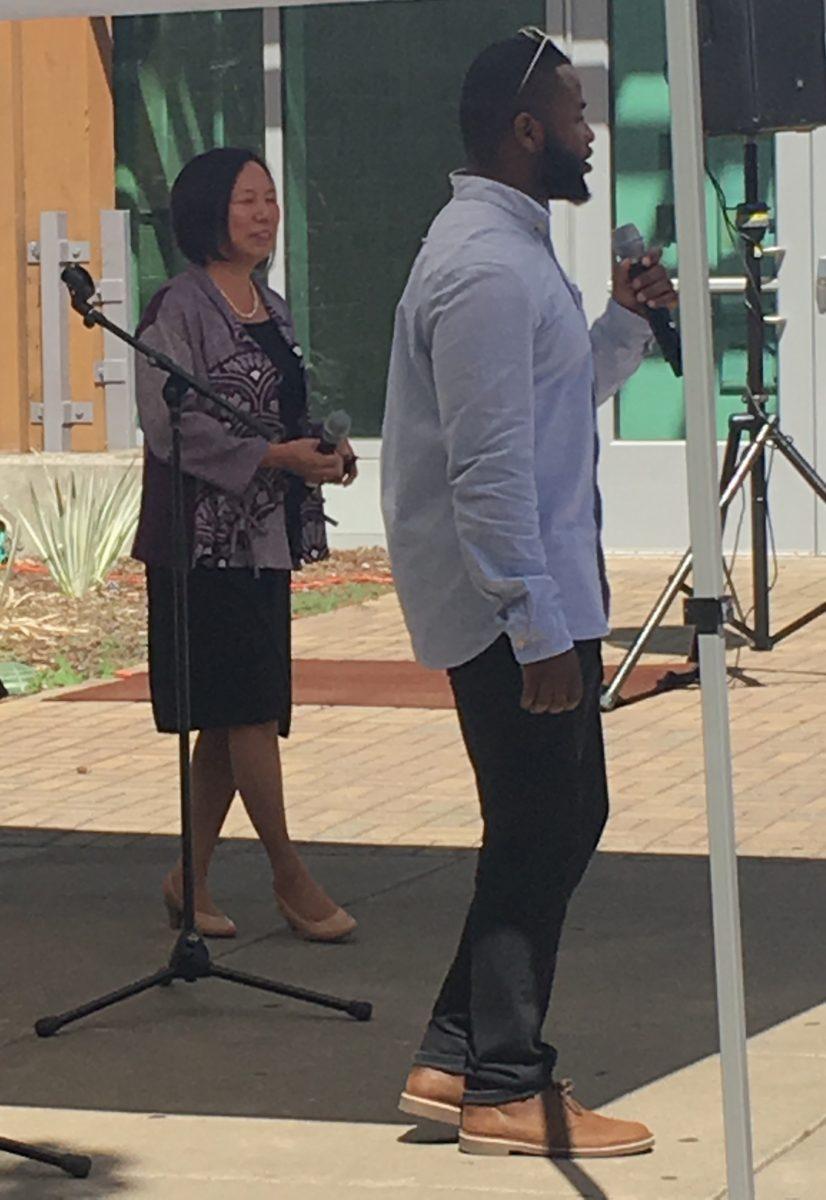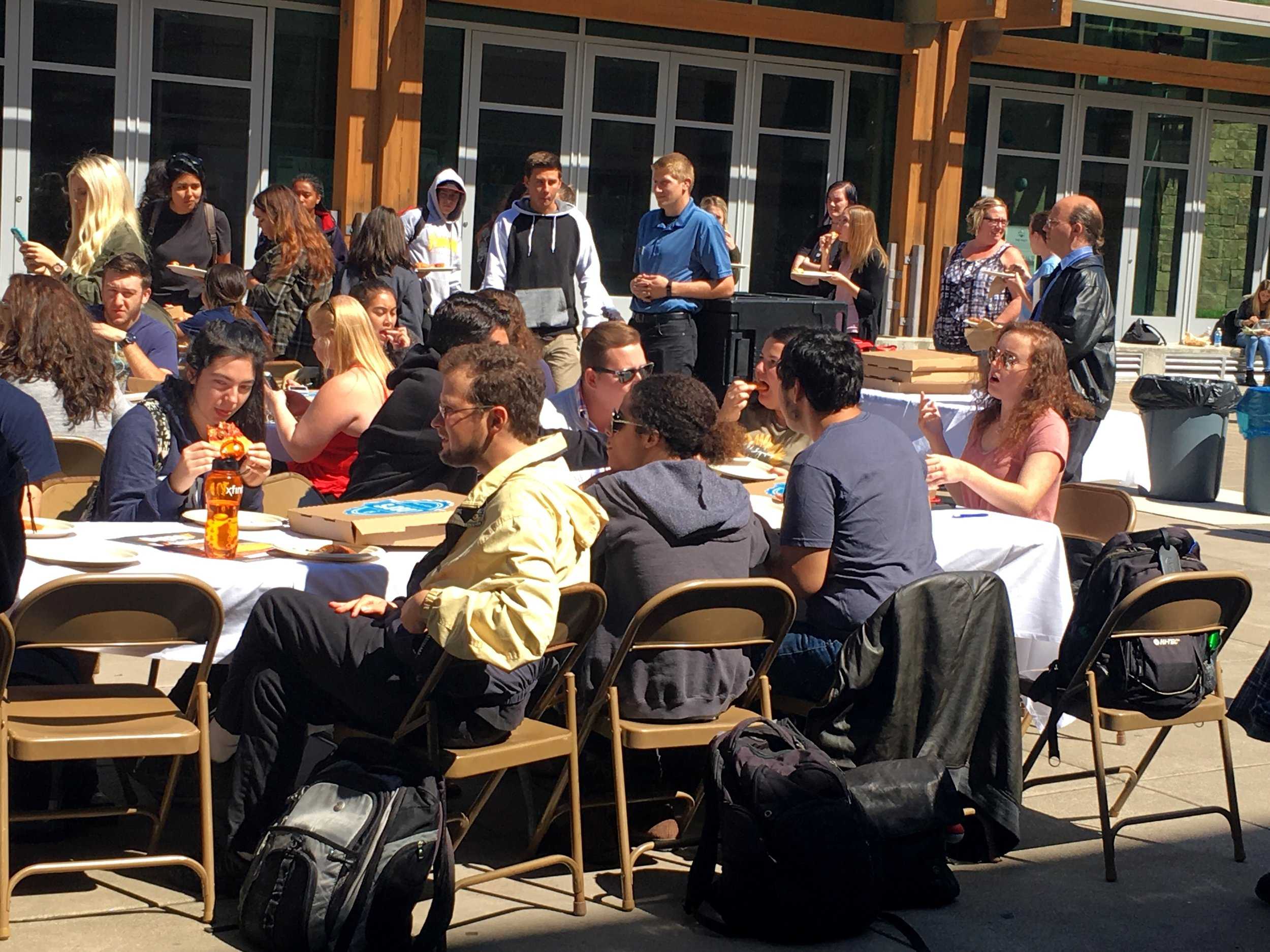It is not every day students can eat pizza while they ask faculty and student leaders about what is happening and what changes are ahead at Sonoma State University.
But on Sept. 14 at noon, the Seawolf Plaza was transformed into an open forum for students to express their thoughts and concerns with campus officials. This was an attempt by the Associated Students to create a stronger bridge between students and student representatives to help recognize and solve campus issues.
“The purpose of Pizza with the Presidents is for Associated Students to work together with [Sonoma State President Judy K.] Sakaki and her cabinet to create another way for students to communicate their thoughts and concerns about our university,” said Madison Cline, vice president of finance for Associated Students.
Long tables with several stacks of pizza allowed easy access for any student to take a seat, eat lunch, and participate in a conversation about Sonoma State student issues. The tables directly faced a tent that housed the executive student leaders Jason Gorelick, Madison Cline, and Wilson Hall. President Sakaki and other members of the university cabinet were also present. A microphone in the center, as well as a handheld microphone being passed around, allowed students to easily voice and bring up issues.
Students actively participated and requested answers on several topics. Questions ranged from “How is the university responding to DACA being rescinded?” to “What measures [are being made] to address parking challenges on campus?”
Associated Students Vice President Jason Gorelick explained the organization’s plan for DACA being rescinded. Gorelick and Senator of Diversity Edgar Sanchez will hold phone banking sessions every Friday for the next six months, along with “Know Your Rights training” in support of DACA.
The Associated Students officials present said that after 5 p.m, reserved parking is considered general parking.
Hall encouraged those struggling to find parking to try the M lot near the Green Music Center, and said Associated Students was working with Sakaki and administrators to get better lighting for some darker parking lots.
Many questions from the crowd focused on the struggles of graduating on time. Some of them referenced the lack of ethnic studies courses offered on campus, despite the subject being a graduation requirement, and the general education pattern setting back students from achieving four-year graduation.
Some of the Associated Students’ responses to graduation-related concerns focused on the new Graduation Initiative created by the chancellor’s office. Sonoma State was awarded $2.1 million with this new initiative in hopes to improve graduation rates. According to Hall, money will be going to full-time faculty and advisors, as well as new resource centers and transfer centers.
Sakaki also said this year’s general education package overhaul would be reviewed, and that it is one of the things she hopes to improve.
The rising prices of on-campus food locations, high tuition, and what some called “subpar classrooms” for the amount students are paying were also concerns vocalized at the event.
Cline reminded students that on-campus food prices are decided by Sonoma State Enterprises and that the organization matches prices with the community to make sure they are not overcharging students. However, students were also told there are some recently changed food policies, including the ability to bring outside catering and food trucks for student organizations.
Hall, the Associated Students president, said the organization may implement a farmers market on campus by next semester at the earliest.
For those who felt they were paying too much money for “subpar” classrooms, Gorelick explained that the new provost recently hired an associate vice president for academic resources. Gorelick gave the associate vice president a tour around campus to show him rooms that were not up to par.
Sakaki said she has a whole new team of administrators that is working to improve these room quality-related issues.
“We will address some of these issues,” Sakaki said. “We need to rebalance things a little bit so that every decision we make that costs money will focus on building up those labs and making sure the right faculty is here.”
Sakaki said she appreciated all the students’ feedback, since it allows student and university leadership to be more aware of student concerns.
“We can’t be the eyes and ears. You’re the eyes and ears,” Sakaki said. “By bringing and hearing issues whether it’s parking, housing, or courses – enables us as both the student leadership and university leadership to say: who’s on that, who’s working on that, and how can we do better because, we’re always in a place to make the university better.”
Gorelick said the goal of this event was to connect with students.
“I think there’s been a history of AS and our student leadership not connecting with students beyond the elections,” Gorelick said. “Our main goal is to keep students in the loop. And one of the most important things for me is to have students be involved in their own advocacy.”
Fifth-year student Miriam Hassman said being kept in the loop was exactly what she wanted.
“I just got back from study abroad, so I missed a lot of what happened in SSU in the past year,” Hassman said. “So a lot of why I came was just to figure out what’s going on, because I’m very out of the loop.”
Hall emphasized the importance of face-to-face interaction with fellow students.
“This event allows students to know that representation is there for them and that their leaders are tangible and accessible,” Hall said. “Just to hear student concerns directly from their mouths, lets students know that their representation is paying attention, and that they have a voice and we are listening.”
Sakaki emphasized the event’s theme of admitting the need for growth and encouraged students who feel their voices are not being heard to not give into that notion.
“Every single voice matters. Every voice and every single experience. And if you hold it in, it doesn’t help us get better,” Sakaki said. “I say that every student, every person at the university, should think about leaving the university better than it was when you got here. And the only way we’re going to get better is if we hear your voice.”




































